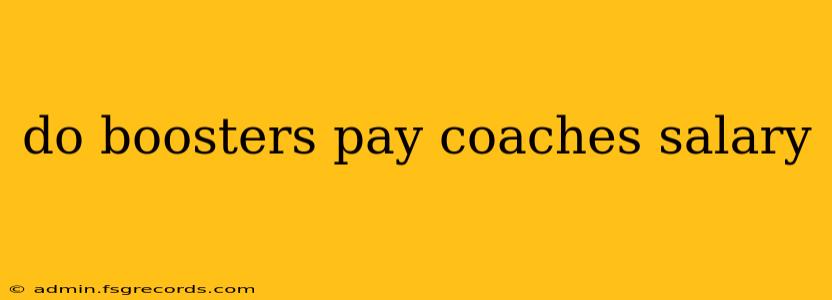Do Boosters Pay Coaches' Salaries? The Complexities of College Athletics Funding
The question of whether boosters pay coaches' salaries is a complex one, with the answer being a nuanced "sometimes, but not directly, and often indirectly through donations." While outright, illegal payments from boosters to coaches are strictly forbidden by the NCAA, the relationship between wealthy donors, athletic programs, and coaching compensation is far more intricate than a simple yes or no.
Here's a breakdown of the different ways boosters influence coaching salaries, both legally and, sometimes, illegally:
Legal Ways Boosters Influence Coaching Salaries:
-
Donations to Athletic Departments: This is the most common and legal method. Boosters, often wealthy alumni or fans, make significant donations to the athletic department. These donations fund a variety of programs, including scholarships, facilities upgrades, and, ultimately, a larger budget that allows the athletic director to offer competitive salaries to attract top coaching talent. The money isn't directly given to the coach; it flows through the official channels of the university.
-
Endowment Funds: Some boosters establish endowment funds specifically dedicated to a particular sport or the athletic department in general. The income generated from these endowments contributes to the overall budget and helps support coaching salaries. This is a long-term, sustainable way of supporting the athletic program.
-
Naming Rights and Sponsorships: Boosters might contribute to the funding of facilities or programs through naming rights or sponsorships. While this doesn't directly pay the coach, it increases the overall revenue of the athletic department, making it possible to afford higher salaries.
Illegal Ways Boosters Might Influence Coaching Salaries (Though Extremely Risky):
-
Undisclosed Payments: This is a serious violation of NCAA rules and can result in severe penalties for both the booster and the coach. Directly paying a coach's salary or offering additional compensation outside the officially reported salary is illegal and unethical.
-
"Gifts" and Perks: Providing lavish gifts or excessive perks to a coach, such as a discounted car or a luxury vacation, can be considered an indirect payment and subject to NCAA scrutiny. These actions are often investigated thoroughly.
The Importance of Transparency and Accountability:
The NCAA constantly strives to maintain transparency and accountability in college athletics to prevent these illegal activities. However, the vast sums of money involved and the pressure to win make it a constant battle. Improved oversight and stricter enforcement of rules are crucial in ensuring ethical practices in college sports.
The Bottom Line:
While boosters don't typically write a coach's paycheck directly, their generous donations are undeniably crucial in creating the financial environment that allows universities to offer competitive salaries to attract and retain top coaching talent. The line between legal support and illegal influence remains a delicate balance, requiring constant vigilance and ethical conduct from all parties involved.

